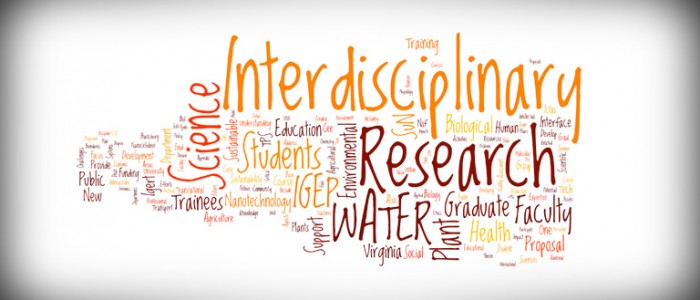Interdisciplinary Research – Lessons in exploring the fringes, juggling career choices, and self-reflection

By Siddhartha Roy
Now, isn’t honesty disarming and priceless? Especially if you hear these words from an established researcher and faculty member. This was just a smattering of some really great discussions students and faculty have had in the IGEP 5134 class that came to an end last week. The Water INTERface, Sustainable Nanotechnology, and Translational Obesity Research IGEPs came together this Spring bringing minds and ideas from very different walks of science – each eager to learn something from the other. Interdisciplinary research is not a new fad but promises to work at the frontiers of science because it is at the intersections of disciplines if we care to meander towards that unconventional solutions to complex problems can be found.
We took personality tests (Myers-Briggs Personality Type) and spent time reflecting what we got and if it made sense. It definitely helped me better understand my own working style (I am someone who is very good at winging it but have the choice not to) and also appreciate how my outlook differs so much from that of others. I think it is critical that self-reflection be made an integral part of our training as scientists and engineers. I got a taste of it in the Engineering Ethics class and through my training in meditation and mindfulness. And it has huge benefits towards aligning us towards our goals and usher in a sense of accountability – no matter what our working style. The National Institutes of Health (NIH) proposals that we wrote in groups were definitely easier since cognizance of every team member’s style and talents made dealing with conflict easier emphasizing on quality ideas above everything else. I wish we had more time to make our proposals more cohesive since everyone in my group worked on their parts individually and then we put it together. Listening to NIH ideas from other IGEPs gave me some Aa-ha! moments as well.
Sharing experiences was another aspect of the class that I really liked. The perspectives of what interdisciplinary research the faculty themselves are engaged in and find satisfaction (or dissatisfaction from). Or what student advising really means to them and how they have developed ways of working with different personality types of students. A student is ultimately responsible for his own project – there is great truth in that statement. Students who took this class two years ago came by and talked about how clueless they themselves are about certain things – the ‘right’ career choice after a PhD, for instance – but enjoy the challenges that the whole process brings to their plate. And how interdisciplinary research was now a small part of their identity as researchers.
We also dipped our beaks into the art of communicating briefly through elevator pitches and discussing career options that emphasize on skills that we are good at. We talked about how literature differs between fields and went to seminars in totally unrelated fields. I walked into a Computer Science talk on forecasting civil unrest and epidemics using big data from the internet and another on celebrity humanitarianism questioning if people like Bono and Angelina Jolie were doing more harm than good with their charity work.
We had outside experts who are paving the path for more interdisciplinary endeavors on campus come by and have a dialogue with us.
The class did have one element which I wasn’t too crazy about – too much of talking makes me wonder if we are accomplishing anything. But that is the inner critic in me.
On a side note, having so many women in class makes me think if men need to up their game in higher education. This seemingly is poised to become the new ‘normal’.


